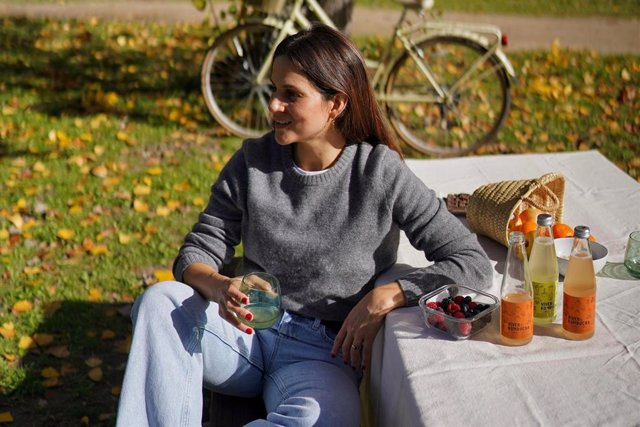MADRID, 18 Dic. (EUROPA PRESS) -
The Granada-based healthy soft drink company Víver Kombucha has specified this Monday the keys to correctly choosing a kombucha, since, in its opinion, "it is important to select a kombucha that respects the traditional recipe for this fermented drink, that has minimal amounts of sugar, that is not pasteurized and whose flavor comes from natural ingredients.
All of this, with the aim of consuming "an authentic kombucha and taking advantage of all the benefits that this healthy drink offers for the body." "With these keys, the consumer is encouraged to identify for themselves when a kombucha is of quality," as explained by the Granada company.
From Víver they have pointed out that the basis for selecting a kombucha that is beneficial for health, while having a great flavor, is found in "carefully reading the product label", so that you can check if it meets your personal preferences in terms of taste. in terms of calories, allergens, ingredients and flavor.
In this sense, they have pointed out that "special attention must be paid to the sugar content, to verify that it is less than 3.5 grams." In cases of higher concentrations, "it will be a symptom that there is sugar added later, therefore, it will not have been consumed in the fermentation and this must be taken into account in terms of health," they added.
Another factor to take into account is that kombucha is a "very low alcoholic" drink, which normally has 0.5% alcohol. "In most cases, this amount is considered residual and legally it is not necessary to mention it on the label in our country because the regulation for alcoholic beverages starts at 1.2%, although it is important to know that it has this minimum amount," they have stressed. from the Granada brand.
On the other hand, they have warned that some brands choose to pasteurize their drink to increase the shelf life of the product and improve its conservation in the environment, achieving a "more stable" product and thus facilitating its transportation as it is not necessary to maintain the cold chain. how well it preserves the properties of this drink". "However, this process eliminates beneficial bacteria as well as live and active cultures," they said.
Thus, although probiotics could be added later, these "would never be the natural ones that arise from the original production process, nor will they be as abundant and varied", thus diminishing the two key elements for the multiple health benefits that kombucha offers.
On the other hand, fermentation results in "one of the safest ways to preserve food even before refrigeration, since this natural process creates interactions with simple ingredients and, over time, helps them develop beneficial nutrients" , they have stressed.
That is why, as Víver Kombucha has pointed out, the best kombuchas are fermented for at least 30 days, "so that ideal interactions and nutrients are created for which time is needed." In the case of the Granada brand, this process lasts up to 40 days, being one of the longest fermentations of all the kombuchas currently on the market.
From Víver Kombucha they have recalled that the basic kombucha recipe is based on the union of tea, water, sugar and wild scoby, which consists of a layer of cellulose that houses the bacteria and yeast cultures that convert the tea into kombucha. In this way, the term 'scoby' comes from the English acronym for 'symbiotic culture of bacteria and yeast'.
In this sense, the Co-CEO of Víver Kombucha, Raúl de Frutos, has explained that the scoby "is what we call mother kombucha." "It is the culture responsible for initiating fermentation and, as if it were alchemy, it transforms a sugary tea solution into a bubbly drink, rich in living microorganisms, organic acids, vitamins, active enzymes, minerals and other elements," he added. .
The natural probiotics in authentic and organic kombucha have the function of rebalancing the intestine with good flora. According to an independent study carried out by the Microal laboratory, "Víver's kombucha yields a result of more than 900 million probiotics per bottle from 20 different species."
In this sense, nutritionist Bianca Bor has indicated that "the amount of probiotics together with their diversity results in greater benefits because each of the microorganisms has different benefits, in fact, the probiotic variety is a fundamental difference compared to other healthy foods that, like yogurt, for example, have two different types of bacteria, compared to 20 in Víver Kombucha.
Another advantage of "good kombucha" is its high content of active enzymes, proteins that help the body break down food. These enzymes aid in digestion, increase nutrient absorption, help build muscle and eliminate toxins, essential for a healthy gut and life.
On the other hand, authentic kombucha naturally produces CO2 during fermentation, creating "its famous effervescent personality." CO2 is normally added, with the aim of "balancing the gas level and avoiding possible fermentation in bottles."
"This is a food safety measure that does not affect the consideration of authentic kombucha, but rather is necessary to quell unwanted effects of fermentation naturally," as explained by Víver Kombucha.
Acetic acids, created during the fermentation process, protect the brew from harmful bacteria and are the source of kombucha's distinctive spicy flavor. Due to their acidic structure, they protect health by promoting alkalinity (pH balance) in the body. Therefore, finding the balance between flavor and properties of a natural formula requires "a lot of experience."
In this sense, De Frutos has explained that "some of the kombucha brands that exist on the market are actually reduced vinegars to which sparkling water, artificial flavors and even sweeteners are added and that can be sold as light or sugar-free drinks. ". "Kombucha concentrates are used from which mass production is carried out but which generate a product that has lost many of its properties and all the living elements that characterize authentic kombucha," he concluded.













